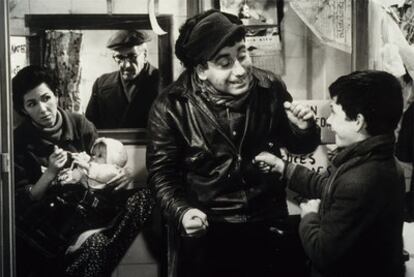Goodbye Mr Berlanga: nation's leading filmmaker dies at 89
Luis García Berlanga's movies painted a portrait of Spanish idiosyncrasy
Spain is Berlanga; Berlanga was Spain. At 5am on Saturday morning Luis García Berlanga, 89, patriarch of Spanish cinema, passed away in his home in Pozuelo de Alarcón, near Madrid. Beginning with Welcome M r Marshall! (1953) his work as director and screenwriter captured the solitude, the meanness, the humanism and the submissive sadness of Spain in the 20th century. Perhaps because his films were so perfectly Spanish, they failed to gain wide recognition abroad, yet today as Spaniards mourn one of their greats, they struggle to define the legacy of this idiosyncratic and contradictory man.
Born in Valencia, the young Berlanga was a loner until the Civil War changed his life. To save his politician father from the death penalty, he joined the Blue Division of Spanish volunteers fighting with the German army in World War II. He studied Law, Philosophy and Letters until changing course in 1947 and entering the Institute of Cinematographic Investigations and Experiences in Madrid, where he made a name for himself as a rebel, along with classmate Juan Antonio Bardem. The two co-directed That Happy Couple .
With the release of that film and Mr Marshall in 1953, modern Spanish cinema was born, along with the foundations of Berlanga's style: humanism with acid humor, bittersweet endings and trueness to life.
After several movies characterized by the grayness of the time period - Boyfriend in Sig ht (1954), Calabuch (1956), Miracles on Thursdays (1957) - the filmmaker met sharp-witted screenwriter Rafael Azcona. They worked together on seven films, including masterpieces Plácido (1961, nominated for an Academy Award) and The Execu tioner (1963), black comedies marked by a lack of communication, a certain cruelty and, at the same time, even greater humanism. In 1986 Berlanga was the first filmmaker to win the Prince of Asturias Award, and in 1993 he won the Goya for best director for Everyone Off to Jail .
The great plotter and daring iconoclast defined himself as an independent bourgeois anarchist, yet in trying to understand him, most get caught up in his innate contradictions: he was lazy yet hard-working, chaste yet sexually obsessed, a pacifist in constant conflict. French actor Michael Piccoli, who worked with Berlanga on two films, said "He is Don Quixote... Well, he could also be Sancho." Franco, upon being told by his ministers that Berlanga was an anarchist, a Bolshevik and a communist, stated "He is much worse than that; he is a bad Spaniard."
The 21st century saw his slow physical decline, hastened by the onset of Alzheimer's disease. In 2002 his son Carlos died, and gradually the great director disappeared from the public eye. His final release, El sueño de la maestra (2002) revived a previously censored piece of Mr M arshall and on 12 June 2021, on what would have been his 100th birthday, the Cervantes Institute will show his very final work, a film that has been kept under seal since 2008.
Berlanga's closed coffin was on display at the Film Academy in Madrid before its burial in Pozuelo on Sunday. Crowds of actors, artists, politicians and other admirers lined up to pay their respects. Academy president Alex de la Iglesia stated "He changed my life," while director José Luis García Sánchez said "He dignified a whole esthetic tradition. His grave should read, instead of RIP, The end."

Tu suscripción se está usando en otro dispositivo
¿Quieres añadir otro usuario a tu suscripción?
Si continúas leyendo en este dispositivo, no se podrá leer en el otro.
FlechaTu suscripción se está usando en otro dispositivo y solo puedes acceder a EL PAÍS desde un dispositivo a la vez.
Si quieres compartir tu cuenta, cambia tu suscripción a la modalidad Premium, así podrás añadir otro usuario. Cada uno accederá con su propia cuenta de email, lo que os permitirá personalizar vuestra experiencia en EL PAÍS.
¿Tienes una suscripción de empresa? Accede aquí para contratar más cuentas.
En el caso de no saber quién está usando tu cuenta, te recomendamos cambiar tu contraseña aquí.
Si decides continuar compartiendo tu cuenta, este mensaje se mostrará en tu dispositivo y en el de la otra persona que está usando tu cuenta de forma indefinida, afectando a tu experiencia de lectura. Puedes consultar aquí los términos y condiciones de la suscripción digital.








































